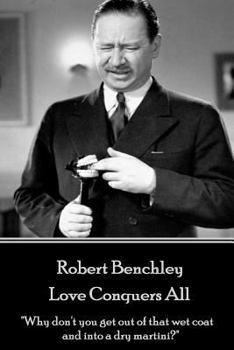Robert Benchley - Love Conquers All: "Why don't you get out of that wet coat and into a dry martini?"
Select Format
Select Condition 
Book Overview
Robert Charles Benchley was born on September 15th, 1889 in Worcester, Massachusetts. Benchley wrote over 600 essays and is a humorist best known for his work for Vanity Fair and The New Yorker. These essays, which ranged from topical to the absurdist, influenced many modern humorists. His humor was obvious from the time he attended Harvard University and was a writer for Harvard Lampoon. Benchley seemed to have an effortless way of creating humour and was equally famous for his work writing and appearing in short films, feature films and radio work. He was also a founder of the famous Algonquin Round Table at the New York hotel. This group, including Benchley, Dorothy Parker and George S Kaufman expanded to over a dozen regular members who met for lunch on an almost daily basis between 1919 and 1929. They dubbed themselves "The Vicious Circle". The group first gathered in the Algonquin's Pergola Room (later called the Oak Room) at a long rectangular table. As the gatherings increased in number, the Algonquin manager Frank Case moved them to the Rose Room and a round table. Daily association with each other, both at the luncheons and outside of them, inspired members of the Circle to collaborate creatively. The entire group worked together successfully only once, however, to create a revue called No Sirree which helped launch a Hollywood career for Benchley. His legacy in Hollywood includes his short film How to Sleep which was a popular success and won Best Short Subject at the 1935 Academy Awards. He also acted with many memorable appearances in feature films such as Alfred Hitchcock's Foreign Correspondent (1940) and Nice Girl? (1941). In Hollywood he worked for many of the major studios and as an actor was often called upon to create humorous points where either a plot could be explained or something that required explaining could be used as a clotheshorse for jokes. In essence a screen image was established as a comic lecturer who tried but failed to clarify any given topic. Whilst Benchley was highly paid and sought after it seemed to leave him less and less time to write the things he cared about. Benchley's drinking, already a problem, had worsened over the years, until he was diagnosed with cirrhosis of the liver. (Ironically, when younger, he had been a devoted teetotaler.) Robert Charles Benchley died in a New York hospital on November 21st, 1945. His funeral was a private family affair, and his body was cremated and interred in a family plot on the island of Nantucket.
Format:Paperback
Language:English
ISBN:178737274X
ISBN13:9781787372740
Release Date:August 2017
Publisher:Horse's Mouth
Length:114 Pages
Weight:0.36 lbs.
Dimensions:0.2" x 6.0" x 9.0"
Customer Reviews
2 ratings
Good Clean Fun
Published by Thriftbooks.com User , 15 years ago
Benchley's eye for the absurd rarely misses, and he offers an entertaining view of a "simpler" time.
A fine collection of humorous short pieces.
Published by Thriftbooks.com User , 20 years ago
"Love Conquers All," by Robert Benchley, is a collection of 63 short humor that appeared in magazines prior to 1922. We have a handful of funny reviews of books that are probably no longer available (but you don't need to know about the book to laugh at the review) such as "Measure Your Mind," or "Those Dangerously Dynamic British Girls." There are a few parodies of opera plots, always a hard thing to do since opera plots are so fundamentally absurd anyway, but Benchley manages it nicely. There are also a few pieces on how to watch various sports; "How to Watch a Chess Match," "Watching Baseball," and "The Score in the Stands" are all a trifle dated but still amuse. Students who go home for Christmas will understand "Home for the Holidays," even though it is quite out of date too; the humor endures even though many of the references are out of date (dress-studs?). All in all, a wonderful book even though some of the humor is a little hard to get to.






